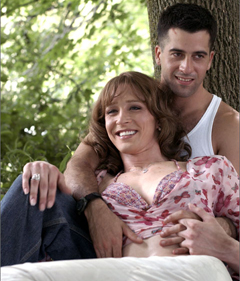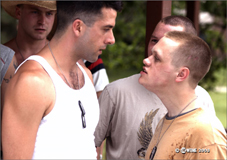Soldier's Girl (Frank Pierson, 2003)
 Frank
Pierson’s surprisingly modest Soldier’s Girl ventures into the same messy emotional and sexual
territory as Kimberly Peirce’s Boys
Don’t Cry, and was similarly based on a true story, but comes up with
decidedly less rewarding results. Narrated by a pre-op transsexual, the film
tells the tale of Barry Winchell, a confused Airborne Infantryman who flirts
with disaster when he flirts with her. Though the opening scene features an
energetic drag rendition of the pop standard “Fever”, the focus quickly
moves away from such glamour to establish the conflicting milieus of
dehumanization and camaraderie that define the Army experience. When Barry first
arrives on the base, he’s discouraged by his fellow soldiers from even using
his first name, so, needless to say, frank discussion of his sexuality is not
encouraged, especially given the Army’s “don’t ask, don’t tell
policy”. These early scenes feel a little routine, perhaps because they have
been done with more aplomb countless times before, but they are more low-key
than usual, and because of that reserve they seem more impressive once Barry
meets Calpernia, the aforementioned transsexual and the film’s ultimate
message becomes apparent.
Frank
Pierson’s surprisingly modest Soldier’s Girl ventures into the same messy emotional and sexual
territory as Kimberly Peirce’s Boys
Don’t Cry, and was similarly based on a true story, but comes up with
decidedly less rewarding results. Narrated by a pre-op transsexual, the film
tells the tale of Barry Winchell, a confused Airborne Infantryman who flirts
with disaster when he flirts with her. Though the opening scene features an
energetic drag rendition of the pop standard “Fever”, the focus quickly
moves away from such glamour to establish the conflicting milieus of
dehumanization and camaraderie that define the Army experience. When Barry first
arrives on the base, he’s discouraged by his fellow soldiers from even using
his first name, so, needless to say, frank discussion of his sexuality is not
encouraged, especially given the Army’s “don’t ask, don’t tell
policy”. These early scenes feel a little routine, perhaps because they have
been done with more aplomb countless times before, but they are more low-key
than usual, and because of that reserve they seem more impressive once Barry
meets Calpernia, the aforementioned transsexual and the film’s ultimate
message becomes apparent.
 Though Soldier’s
Girl uses their meeting to launch into a heady account of bewildered young
love, it’s the on-base tensions that provide the most dramatic moments. As
Barry’s bunkmate, the Iago-like Fisher, Shawn Hatosy is superb because he
conveys an unintelligent dependence on routine and an obsessive-compulsive
streak as often as he does Machiavellian plotting. The suggestion that lies
within the character that the former motivates the latter drives home the
ultimate senselessness that leads to the climax. The unspoken dynamic in his
character seems to be that the rigidity of Army life provides the balance to his
precariously unbalanced mind and Hatosy manages to make Fisher alternately
sympathetic, charismatic, and repulsive. Troy Garity, who plays Barry, is almost
as good. His character has a slight speech impediment and a learning disability,
and to a degree, it’s his vacuity that allows the viewer to make whatever we
want out of him. It’s a testament to the actor playing the role that we’re
able to find Barry interesting at all. Since Garity treads a fine line in which
the character’s sexual and intellectual confusions blur, there exists real
complexity in what’s otherwise a rather thin characterization.
Though Soldier’s
Girl uses their meeting to launch into a heady account of bewildered young
love, it’s the on-base tensions that provide the most dramatic moments. As
Barry’s bunkmate, the Iago-like Fisher, Shawn Hatosy is superb because he
conveys an unintelligent dependence on routine and an obsessive-compulsive
streak as often as he does Machiavellian plotting. The suggestion that lies
within the character that the former motivates the latter drives home the
ultimate senselessness that leads to the climax. The unspoken dynamic in his
character seems to be that the rigidity of Army life provides the balance to his
precariously unbalanced mind and Hatosy manages to make Fisher alternately
sympathetic, charismatic, and repulsive. Troy Garity, who plays Barry, is almost
as good. His character has a slight speech impediment and a learning disability,
and to a degree, it’s his vacuity that allows the viewer to make whatever we
want out of him. It’s a testament to the actor playing the role that we’re
able to find Barry interesting at all. Since Garity treads a fine line in which
the character’s sexual and intellectual confusions blur, there exists real
complexity in what’s otherwise a rather thin characterization.
 It’s tough
to believe that Barry initially doesn’t realize that Calpernia is still
biologically male, even if he’s “from Kansas”, since he has friends that
are far more worldly than him (not to mention that she sports broad shoulders
and man-hands). Thankfully, the possibility that he does indeed know what he’s
getting into but is acting coy is raised more than once. Still, this uncertainty
in his role is a bit of a liability, since it seems a case of the film
attempting to cater to both the conservative and more open-minded audience
member. The story begins with Calpernia’s narration, and allows the audience
to identify with her throughout, suggesting that is presupposes a certainly
worldliness in the viewer, but for some reason it keeps treading into the
unwelcome didacticism of a message movie. There’s a speech where Calpernia’s
girlfriend Ginger matter-of-factly states, “Sexual orientation isn’t black
and white,” and a similarly strained scene between two commanding officers
where they debate the Army’s stance on homosexuals. The conflict between
delivering an important message about tolerance to the uninformed and telling a
story of the informed for the informed results in a muddle, but that confusion
of intent dissipates enough so that the tragic climax can be gut wrenchingly
powerful.
It’s tough
to believe that Barry initially doesn’t realize that Calpernia is still
biologically male, even if he’s “from Kansas”, since he has friends that
are far more worldly than him (not to mention that she sports broad shoulders
and man-hands). Thankfully, the possibility that he does indeed know what he’s
getting into but is acting coy is raised more than once. Still, this uncertainty
in his role is a bit of a liability, since it seems a case of the film
attempting to cater to both the conservative and more open-minded audience
member. The story begins with Calpernia’s narration, and allows the audience
to identify with her throughout, suggesting that is presupposes a certainly
worldliness in the viewer, but for some reason it keeps treading into the
unwelcome didacticism of a message movie. There’s a speech where Calpernia’s
girlfriend Ginger matter-of-factly states, “Sexual orientation isn’t black
and white,” and a similarly strained scene between two commanding officers
where they debate the Army’s stance on homosexuals. The conflict between
delivering an important message about tolerance to the uninformed and telling a
story of the informed for the informed results in a muddle, but that confusion
of intent dissipates enough so that the tragic climax can be gut wrenchingly
powerful.
* * *
05-06-03
Jeremy Heilman